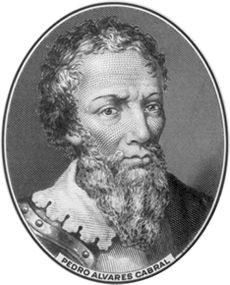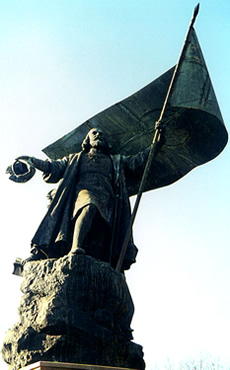World History
Commissioned by the king of Portugal Manuel I to follow the route of fellow Portuguese navigator Vasco Da Gama around the Cape of Good Hope on a major trading expedition to India, the nobleman Pedro Ãlvares Cabral set sail from Lisbon on March 8, 1500, in command of 1,200 men in 13 ships laden with trade goods and provisions sufficient to last a year.
Swinging far to the west—by some accounts to avoid a brewing storm, by others in consequence of being blown off course by a storm—on April 2, 1500, he encountered instead the coast of Brazil, with whose discovery he is generally credited.
There, at various spots along the beach, he and his crew spent nine days peaceably bartering and interacting with the natives. Building a large wooden cross, planting a flag, and claiming the land for Portugal, Cabral and his expedition sailed on to India. He left behind two convicts, previously condemned to death, in the hopes that they would mix with the natives.
What became of them is not known, though the episode illustrates the Portuguese policy of promoting miscegenation as a way to draw unknown lands and peoples into the Portuguese orbit.
Cabral also filled one of his ships, the Lemos, with brazilwood, a red-tinted tree whose pulp, he correctly surmised, would serve as a commercially viable textile dye. Cabral sent the Lemos and brazilwood straight back to Portugal, along with a long descriptive letter on the discovery from the ship’s chronicler, Pêro Vaz de Caminha.
Caminha’s letter was the first European eyewitness description of Brazil. In it he paid special attention to what he perceived as the simplicity, innocence, and primitivism of the people, represented especially in their nakedness.
His report, like those of others who followed in subsequent years, fueled the European imagination regarding the “noble savages†inhabiting the New World. Caminha was also struck by the natives’ lack of domesticated animals; their lack of knowledge of metal, including gold; and the limited commercial potential of the land and its people.
Fortunately for the Portuguese the lands Cabral and his men had just encountered fell well within the boundaries of the lands granted to Portugal as codified in the Treaty of Tordesillas of 1494.
In subsequent years, the Portuguese Crown commissioned a series of navigators to continue the explorations and trade relations begun by Cabral. By the 1530s, Brazil had been loosely incorporated into the Portuguese sphere of influence, though their superior position was tentative and under serious challenge by the French.
- Conquest And Colonization Of Brazil
Conquest and Colonization of Brazil The Portuguese conquest of Brazil was a complex, prolonged, and partial process that many scholars argue was never fully realized. Lacking large cities, a centralized political structure, and a common language, the...
- Bartolomeu Dias - Portuguese Explorer
Bartolomeu Dias - Portuguese ExplorerBartolomeu Dias, sometimes spelled Bartholomew Diaz, was an explorer for the Portuguese. He is best known for being the first European to round the southern tip of Africa, thereby establishing a sea trading route between...
- Vasco Da Gama - Portuguese Explorer
Vasco da Gama - Portuguese ExplorerVasco da Gama was a Portuguese explorer who discovered the sea route to India from Europe through the Cape of Good Hope. It is believed that da Gama was born in Sines, Portugal, in approximately 1460. He received his...
- History Of Cape Verde
History of Cape Verde. This is a short but good look at the history of this island nation off of the coast of Africa. From the site: In 1462, Portuguese settlers arrived at Santiago and founded Ribeira Grande (now Cidade Velha)--the first permanent...
- History Of Brazil
History of Brazil. This is a nice short overview of the history of Brazil. It is well written but basically concentrates on modern Brazilian history. From the site: Pedro Alvares Cabral claimed Brazil for Portugal in 1500. The colony was ruled from...
World History
Pedro Ãlvares Cabral
 |
| Pedro Ãlvares Cabral |
Swinging far to the west—by some accounts to avoid a brewing storm, by others in consequence of being blown off course by a storm—on April 2, 1500, he encountered instead the coast of Brazil, with whose discovery he is generally credited.
There, at various spots along the beach, he and his crew spent nine days peaceably bartering and interacting with the natives. Building a large wooden cross, planting a flag, and claiming the land for Portugal, Cabral and his expedition sailed on to India. He left behind two convicts, previously condemned to death, in the hopes that they would mix with the natives.
  |   |
What became of them is not known, though the episode illustrates the Portuguese policy of promoting miscegenation as a way to draw unknown lands and peoples into the Portuguese orbit.
Cabral also filled one of his ships, the Lemos, with brazilwood, a red-tinted tree whose pulp, he correctly surmised, would serve as a commercially viable textile dye. Cabral sent the Lemos and brazilwood straight back to Portugal, along with a long descriptive letter on the discovery from the ship’s chronicler, Pêro Vaz de Caminha.
 |
| statue of Pedro Ãlvares Cabral |
His report, like those of others who followed in subsequent years, fueled the European imagination regarding the “noble savages†inhabiting the New World. Caminha was also struck by the natives’ lack of domesticated animals; their lack of knowledge of metal, including gold; and the limited commercial potential of the land and its people.
Fortunately for the Portuguese the lands Cabral and his men had just encountered fell well within the boundaries of the lands granted to Portugal as codified in the Treaty of Tordesillas of 1494.
In subsequent years, the Portuguese Crown commissioned a series of navigators to continue the explorations and trade relations begun by Cabral. By the 1530s, Brazil had been loosely incorporated into the Portuguese sphere of influence, though their superior position was tentative and under serious challenge by the French.
- Conquest And Colonization Of Brazil
Conquest and Colonization of Brazil The Portuguese conquest of Brazil was a complex, prolonged, and partial process that many scholars argue was never fully realized. Lacking large cities, a centralized political structure, and a common language, the...
- Bartolomeu Dias - Portuguese Explorer
Bartolomeu Dias - Portuguese ExplorerBartolomeu Dias, sometimes spelled Bartholomew Diaz, was an explorer for the Portuguese. He is best known for being the first European to round the southern tip of Africa, thereby establishing a sea trading route between...
- Vasco Da Gama - Portuguese Explorer
Vasco da Gama - Portuguese ExplorerVasco da Gama was a Portuguese explorer who discovered the sea route to India from Europe through the Cape of Good Hope. It is believed that da Gama was born in Sines, Portugal, in approximately 1460. He received his...
- History Of Cape Verde
History of Cape Verde. This is a short but good look at the history of this island nation off of the coast of Africa. From the site: In 1462, Portuguese settlers arrived at Santiago and founded Ribeira Grande (now Cidade Velha)--the first permanent...
- History Of Brazil
History of Brazil. This is a nice short overview of the history of Brazil. It is well written but basically concentrates on modern Brazilian history. From the site: Pedro Alvares Cabral claimed Brazil for Portugal in 1500. The colony was ruled from...
